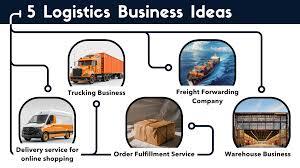Starting a logistics business can be a lucrative opportunity in today’s globalized economy. With the rise of e-commerce, manufacturing, and international trade, companies increasingly rely on third-party logistics services to streamline their operations. However, like any business venture, starting a logistics company involves careful planning and understanding the associated costs. In this article, we will explore the factors that determine the cost of starting a logistics business, discuss why it’s a great choice for entrepreneurs.
Introduction to Logistics Business
Logistics is the backbone of supply chain management, involving the coordination and transportation of goods from one location to another. The success of businesses today often depends on efficient logistics operations, making it a vital part of various industries. A logistics business can range from small-scale courier services to large freight forwarding companies dealing with global shipments. Depending on the scope and scale, the initial investment required for a logistics business can vary significantly.
This guide will delve into the factors influencing costs, while also providing insights into logistics business ideas that can help you decide which niche is most suitable for you.
Why Choose a Logistics Business?
The logistics sector is growing rapidly, driven by increased demand for transportation and delivery services. Here’s why choosing a logistics business is a smart decision for entrepreneurs:
- Growing Market Demand: The continuous expansion of e-commerce, retail, and manufacturing sectors has resulted in a higher demand for logistics services. Businesses across industries need reliable partners to transport goods efficiently, making logistics a thriving industry.
- Diverse Opportunities: The logistics industry offers diverse business ideas ranging from warehousing, distribution, and freight forwarding to last-mile delivery services. Entrepreneurs can choose a niche that aligns with their expertise and market demand.
- Scalability: Logistics businesses have the potential to scale based on market demand. You can start small with limited resources and gradually expand by adding more vehicles, employees, or services.
- Profitability: With efficient management and cost control, logistics businesses can generate significant profits. Once established, they benefit from recurring revenue streams, long-term contracts, and opportunities to serve various industries.
- Essential Service: Logistics services are critical to keeping the economy running. Whether it’s transporting essential goods, raw materials, or retail products, businesses depend on logistics companies to ensure smooth operations.
Types of Logistics Businesses
Before diving into the cost breakdown, it’s important to understand the various types of logistics businesses you can start. Each type requires different levels of investment, infrastructure, and expertise:
- Freight Forwarding: Freight forwarders arrange the transportation of goods for clients by negotiating with carriers and managing logistics processes such as documentation, insurance, and customs clearance.
- Warehousing and Distribution: This involves providing storage solutions to businesses and managing the distribution of goods to their final destination.
- Courier and Delivery Services: Offering last-mile delivery services is a growing trend, especially with the rise of e-commerce. This type of business typically requires smaller upfront investments but involves more operational logistics.
- Transportation Services: This includes owning and operating a fleet of trucks or other vehicles to transport goods between locations. It requires significant capital investment in vehicles and equipment.
- Third-Party Logistics (3PL): 3PL providers offer comprehensive logistics services, including transportation, warehousing, and distribution. They handle the entire supply chain process for clients, providing end-to-end solutions.
- Reverse Logistics: This involves managing the return of goods, which is crucial in industries like e-commerce where returns are common. Businesses may specialize in handling the transportation and reprocessing of returned items.
Benefits of Starting a Logistics Business
- High Demand: As mentioned earlier, logistics services are in constant demand. Every business needs logistics support, whether for local distribution or international shipping.
- Flexible Business Models: You can start with a specific service, like courier delivery, and gradually expand into other areas such as warehousing or freight forwarding.
- Recurring Revenue: Many logistics companies operate on contracts with businesses, ensuring a steady flow of income through long-term relationships.
- Diverse Clientele: A logistics business serves various sectors like retail, manufacturing, agriculture, healthcare, and technology, offering ample opportunities for expansion.
- Global Reach: With advancements in technology and infrastructure, logistics businesses can easily expand their operations internationally.
Steps to Start a Logistics Business
Starting a logistics business requires careful planning and strategic execution. Here are the steps involved:
- Identify Your Niche
First, decide which area of logistics you want to focus on. Look at different logistics business ideas and assess which niche aligns with your skills, resources, and market demand. For example, do you want to start a local courier service or invest in a large-scale freight forwarding business?
- Create a Business Plan
A detailed business plan is essential for setting goals, securing funding, and outlining your operational strategy. Your plan should include market analysis, financial projections, marketing strategy, and a breakdown of the required resources.
- Understand the Legal Requirements
Logistics businesses need to comply with various regulations depending on their location and services. This may include licensing, permits, and certifications. Make sure to register your business, obtain the necessary permits, and follow transportation regulations, especially if dealing with international shipments.
- Determine Initial Investment
The cost of starting a logistics business will vary based on the type of business, location, and scope of operations. Some common expenses include:
- Vehicle and Equipment: Transportation services require purchasing trucks, vans, or other vehicles. Warehousing services require forklifts and storage systems.
- Technology: Invest in logistics software for tracking shipments, managing inventory, and coordinating routes.
- Staffing: Hiring drivers, warehouse managers, and administrative staff will also impact your budget.
- Insurance: You’ll need comprehensive insurance to cover vehicles, goods in transit, and liability issues.
- Warehousing: If you’re offering storage or distribution services, you’ll need to invest in renting or buying warehouse space.
- Secure Funding
Once you have a clear idea of your startup costs, explore funding options. You may need a combination of personal savings, bank loans, or investor backing to cover initial expenses.
- Set Up Your Operations
After securing funding, invest in the necessary infrastructure, including vehicles, warehouses, software, and staffing. Establish a reliable supply chain network and partnerships with carriers, vendors, or distributors.
- Marketing and Networking
Promote your business by developing a strong online presence and attending industry events. Build relationships with potential clients, and offer competitive rates to attract long-term contracts.
Conclusion
Starting a logistics business requires careful planning, financial investment, and a deep understanding of supply chain processes. However, the potential rewards make it a highly attractive option for entrepreneurs. By choosing the right logistics business ideas and executing a well-thought-out strategy, you can tap into a growing industry with a broad range of opportunities.
FAQs
How much does it cost to start a logistics business?
The cost can vary widely depending on the type and scale of the business. For a small courier service, you might need as little as $10,000, while a full-scale freight forwarding company could require hundreds of thousands of dollars.
What are the logistics business ideas I can consider?
Some logistics business ideas include starting a courier service, offering warehousing solutions, freight forwarding, or becoming a third-party logistics (3PL) provider.
Is the logistics business profitable?
Yes, with proper management, a logistics business can be highly profitable. Profit margins depend on factors like operational efficiency, customer contracts, and market demand.
Do I need a license to start a logistics business?
Yes, depending on your location and the services you provide, you will need various permits and licenses to operate legally.
Can I start a logistics business with no experience?
While experience in logistics or supply chain management is helpful, it is possible to start a logistics business with the right team, resources, and market knowledge.
How Long Does It Take to Deliver a Gift to Pakistan from the US?



